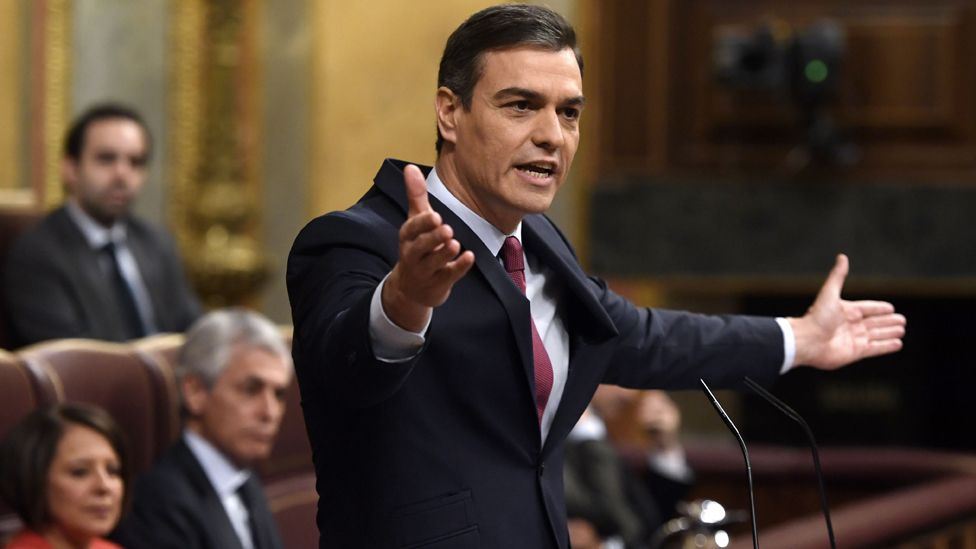By Phaidra Chrysostali,
Spain is currently dealing with a political struggle that has alerted the EU stage due to the large protests erupting all over the cities. The Spanish turmoil began after Prime Minister Pedro Sánchez, violated the rule of law when he offered amnesty to Puigdemont and other convicted Catalans in exchange for voters.
Prime Minister Pedro Sánchez, who has been in power since 2018, did not succeed in securing the parliamentary support to form a government in the July elections, despite the support of the far-right Vox party. Therefore, to defeat his opponent, Alberto Nunez Feijoo, he sought an alliance with the regionalist groups, which included the Catalan pro-independence parties. In exchange for their voters, Sanchez accepted several concessions including the adoption of the amnesty bill for separatist leaders and activists who were prosecuted for their involvement in Catalonia’s 2017 secession attempt, and as a result, he managed to reach a governing majority.

The Catalan independence movement is a political and social movement that seeks the independence of Catalonia from Spain. Catalonia is home to 7.7 million people and is governed by a crucially fragile coalition of pro-independence parties who seek economic independence and a separate identity from Spain. Catalan separatists can be traced back to the 19th century through regionalist and nationalist movements that were most likely influenced by the idea of bringing back the history of the Catalan identity of the Middle Ages. As these ideas were surfacing in 2017, 92% of the Catalan population backed an illegal referendum on October 1 2017 that supported the separation of Catalonia from Spain. The Catalan parliament proceeded to declare independence but the Spanish government did not tolerate such action and using the article 155 emergency powers, it imposed a direct rule, dissolved the parliament, and sacked its leaders. During these events, the Spanish government imprisoned politicians and beat voters and finally, Spain’s Supreme Court sentenced nine of the Catalan leaders.
Catalan separatists have been an internal matter for Spain for many years and the government failed to deal with the separatists’ pleas for support. As a consequence, the issue has been damaging Spain’s democratic credentials, and was also indicated in the 2017 Economist Intelligence Unit that Spain risked being downgraded from a “full democracy” to a “flawed” one over its handling of the situation. Sánchez’s action of using the amnesty threatened once again the independence of Spain’s judiciary, and as a result, led 170,000 out onto the streets demonstrating and demanding not to let separatists divide Spain. Could we consider Sánchez’s action as a national betrayal? Can a Western government tolerate such actions or should it be stricter when dealing with unethical leaders?
Spanish citizens do not seem willing to tolerate Sánchez’s cooperation with the Catalan separatists and have fueled a large Spanish nationalist movement. Conservatives and right-wing parties have strongly condemned Sánchez’s “unethical” action and lack of moral limits. The majority of Spain believes that the amnesty will bring back Catalan separatists and history will be repeated, and this time maybe even worse.

In conclusion, Spain is currently in a very fragile position since there is no political stability and Sánchez seems unphased and unbothered by the thousands of protesters who are marching every day in the streets. The imprisonment of the nine Catalan leaders had brought more stability to the political stage of Spain and pro-independence movements seemed to have decreased. There is no doubt that, despite Sánchez’s decision to offer amnesty, Spain must try to integrate Catalans and eliminate the gap between the whole of Spain and Catalonia. Cooperation could ease their relations and with time offer the government stability.
References
- Astier, Henri. “Spain’s Conservatives Rally against Deal with Catalan Separatists.” BBC News, 2023. Available here
- BBC. “Catalonia’s Bid for Independence from Spain Explained.” BBC News, 2018. Available here
- Jones, Sam. “Rally Held in Madrid against Catalan Amnesty after Sánchez Sworn in as Spanish PM.” The Guardian, 18 Nov. 2023. Available here
- “Thousands Protest in Madrid over Proposed Amnesty for Catalan Separatists.” France 24, 2023. Available here




